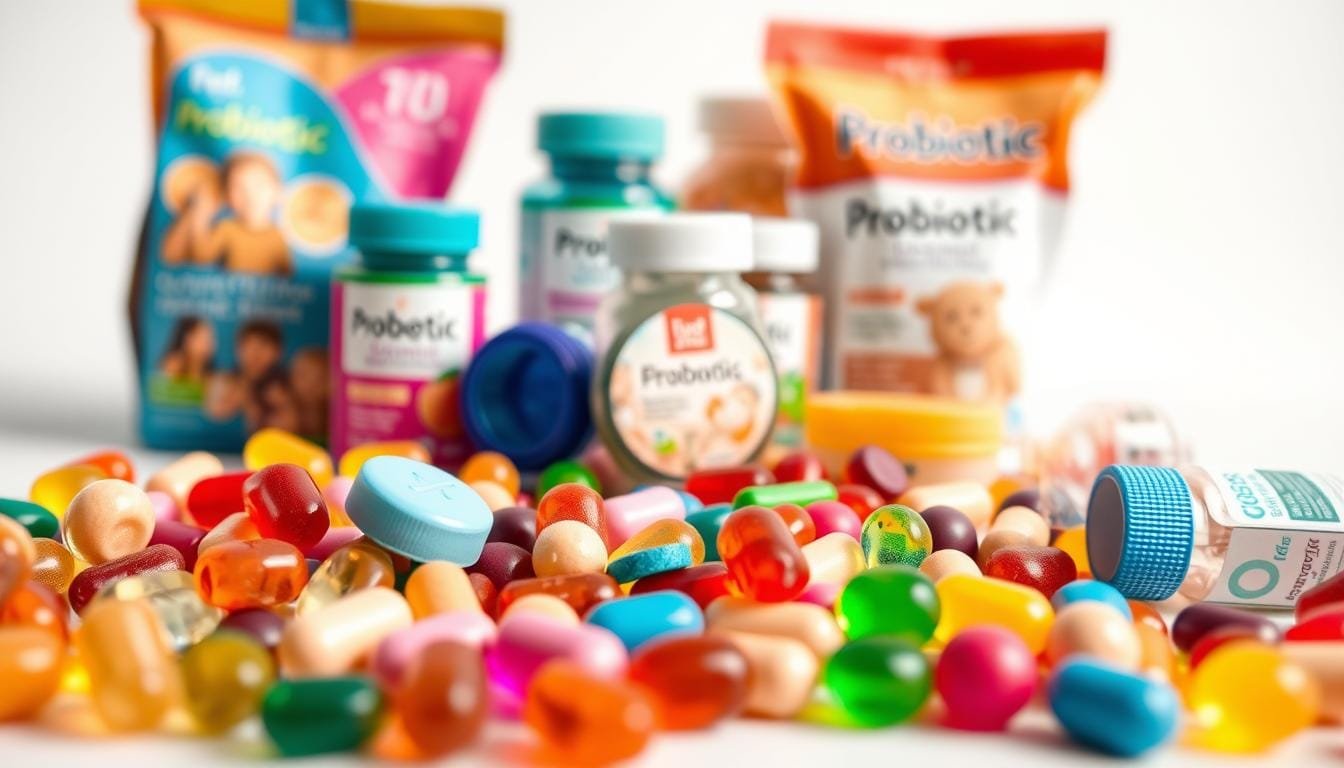Currently Empty: RM0.00
“The greatest wealth is health.” – Virgil. This ancient wisdom resonates deeply with Malaysian parents today as they seek the best wellness solutions for their children.
In recent years, Malaysian families have shown growing interest in digestive supplements for young ones. Many wonder about the role of beneficial bacteria in supporting their children’s development.
These live microorganisms, known as probiotics, work to maintain balance in the digestive system. Research reveals that gut bacteria communicate with both the brain and immune system, playing a vital role in overall wellness.
Wellness Concept understands that parents want clear answers about supplement safety. This guide provides evidence-based information to help families make informed decisions.
The article explores scientific research, potential benefits, and practical considerations for Malaysian households. It takes a balanced approach to examining both advantages and concerns.
Understanding gut health and microbiome function helps parents support their child’s digestive and immune development. While these supplements show promise, complete information empowers better choices for individual needs.
Key Takeaways
- Probiotics contain live beneficial bacteria that support digestive health
- Gut microbiome plays a significant role in children’s overall wellness
- Malaysian parents are increasingly interested in probiotic supplements
- Safety considerations vary based on individual child needs
- Evidence-based guidance helps families make informed decisions
- Digestive health connects to immune system development
- Professional advice ensures appropriate supplement choices
Understanding Probiotics and Their Role in Children’s Health
Within every child’s digestive tract lives an entire ecosystem of microscopic organisms. This internal world plays a crucial role in their development and daily wellbeing.
What are Probiotics?
Probiotics are live microorganisms that provide health benefits when consumed. They function as beneficial bacteria that support the delicate balance in children’s bodies.
These friendly microorganisms help maintain optimal conditions in the digestive system. They work by crowding out harmful bacteria and supporting intestinal lining integrity.
Benefits of a Balanced Gut Microbiome
A well-balanced gut microbiome supports multiple body systems. It enhances nutrient absorption and promotes efficient digestion.
The relationship between gut bacteria and the immune system is particularly important. A significant portion of immune function originates in the digestive tract.
Research continues to reveal connections between gut health and brain development. Emotional wellbeing and cognitive function may also benefit from microbial balance.
| Aspect | Balanced Gut | Unbalanced Gut |
|---|---|---|
| Digestive Function | Efficient nutrient absorption | Frequent discomfort |
| Immune Support | Strong defense system | Increased susceptibility |
| Overall Health | Optimal development | Frequent disruptions |
These beneficial microorganisms occur naturally in fermented foods. They are also available in various supplement forms designed for young ones.
How Probiotics Work: From Birth to Childhood
From the first breath a baby takes, their digestive system embarks on an incredible developmental journey. This process establishes the foundation for their future health and wellbeing.
Gut Development in Infants
A newborn’s digestive tract begins sterile but quickly welcomes beneficial bacteria. Within hours and days, colonization occurs from the environment.
Breast milk serves as the primary source for these essential microorganisms. It provides both live bacteria and prebiotics that nourish them.
Human milk oligosaccharides (HMOs) are unique components found only in breast milk. They specifically promote healthy bacteria growth in infants.
Some situations may benefit from additional support. Premature babies or those receiving antibiotics might need probiotic supplements to restore balance.
Transitioning from Breast Milk to Probiotic Foods
As children grow, their gut microbiome continues to diversify. The introduction of solid foods marks an important milestone.
This transition establishes patterns that influence health throughout childhood. The early establishment of a healthy gut creates a strong foundation.
For babies not breastfed, some formulas now include added probiotics and HMOs. These mimic the benefits of natural breast milk.
Parents seeking detailed safety information can find comprehensive guidance. Understanding this developmental process helps make informed choices.
Are Probiotics Safe for Kids
Parents naturally wonder about the appropriateness of microbial supplements for their children’s delicate systems. Research provides reassuring answers for most families.
Evaluating Research and Expert Opinions
Numerous studies have examined the safety of these supplements. Most research concludes they typically don’t cause harm in healthy children.
Individual responses may vary since each child’s gut microbiome resembles a unique fingerprint. The right bacterial strains must match the child’s individual ecosystem to provide benefits.
Some researchers question whether these supplements help children with developing digestive systems. Others see potential advantages in specific health conditions.

Age Considerations and Safety Guidelines
Experts recommend waiting until a child is over one year old before introducing supplements. Limited safety data exists for infants.
Children with compromised immune systems or serious medical conditions need special consideration. Those with central lines or ports should avoid these supplements due to rare sepsis cases.
Always consult a pediatrician before starting any new supplement regimen. They can recommend appropriate options based on your child’s unique health profile.
Pros and Cons of Probiotic Supplements for Children
Every supplement choice involves weighing potential gains against possible drawbacks. Understanding both sides helps parents make confident decisions for their child’s wellness journey.
Potential Health Benefits
These supplements may help children with various digestive concerns. Research shows they can support recovery from gastrointestinal infections.
The health benefits extend to preventing infectious diarrhea in young ones. They work by maintaining a healthy balance of gut bacteria.
Some studies suggest these supplements might play a role in healthy weight maintenance. However, more research is needed in this area.
Each child responds differently due to their unique microbiome. This explains why some studies show strong benefits while others show minimal effects.
Possible Side Effects and Precautions
Most children experience no adverse effects from these supplements. When side effects occur, they’re typically mild and temporary.
The most common symptoms include temporary bloating or gas. These usually resolve as the digestive system adjusts.
Yeast-based formulations might cause increased thirst or constipation. Adjusting the dosage often manages these effects effectively.
Rare side effects include temporary itching of eyes or skin. Though uncomfortable, these symptoms typically disappear quickly.
Since these products aren’t FDA-regulated, standardization varies between brands. Starting with low doses and monitoring the child’s response is recommended.
Parents should check labels for potential allergens. Discontinuing use if persistent symptoms develop is advised.
Exploring Different Types of Probiotics and Natural Foods
Modern probiotic options for children come in forms designed to suit different preferences and needs. Parents can choose from various supplement types or incorporate probiotic-rich foods into daily meals.
Supplement Options: Drinks, Powders, and Gummies
Probiotic drinks often feature yogurt bases with child-friendly flavors. These beverages provide easy consumption and typically contain live active cultures.
Powders offer excellent mixing versatility. Parents can blend them into smoothies, yogurt, or cereal without altering taste significantly.
Gummies are popular because children view them as treats rather than supplements. However, parents should check sugar content and choose low-sugar options when possible.
Natural Food Sources: Yogurt, Kefir, and Fermented Vegetables
Yogurt remains one of the most accessible probiotic foods. Look for varieties labeled with live and active cultures to ensure beneficial bacteria presence.
Kefir contains a diverse range of probiotic strains. This fermented dairy product has thinner consistency than yogurt and is often well-tolerated.
Fermented vegetables like pickles and kimchi also provide natural probiotics. Introduce these foods gradually based on your child’s taste preferences.
Always check ingredient lists for potential allergens in both supplements and foods. Combining different sources can support microbiome diversity through various strains.
Professional Guidance and Wellness Concept Support
Making decisions about children’s health involves careful consideration of individual needs. Each child’s body responds differently to supplements and dietary changes.
Wellness Concept provides personalized support for Malaysian families navigating these choices. Their team helps parents understand whether specific approaches suit their child’s unique situation.
Booking an Appointment and Consultation
Professional guidance ensures children receive appropriate care based on their health profile. Wellness Concept’s experts review individual needs before making recommendations.
They help parents interpret conflicting studies about microbial supplements. This clarity supports informed decisions about a child’s overall health journey.
A balanced diet remains fundamental for supporting gut health naturally. Fresh fruits, vegetables, and yogurt promote beneficial microorganisms without supplements.
| Approach | With Professional Guidance | Self-Guided Decisions |
|---|---|---|
| Supplement Choices | Personalized recommendations | Generic product selection |
| Diet Planning | Tailored nutritional advice | Standard meal patterns |
| Antibiotic Awareness | Clear infection guidance | Uncertain treatment needs |
| Long-term Health | Comprehensive wellness plan | Fragmentary approaches |
Limiting unnecessary antibiotics protects the gut microbiome. These medications eliminate both harmful and beneficial bacteria when used inappropriately.
Wellness Concept helps parents distinguish between bacterial and viral infections. This knowledge prevents antibiotic overuse that can disrupt a child’s digestive system.
Contact Information and Business Hours
Malaysian families can connect with Wellness Concept through multiple channels. Their team understands local health concerns and cultural preferences.
WhatsApp provides convenient communication at +60123822655. Business hours accommodate working parents: Monday-Friday 9:30 am-6:30 pm, weekends 10 am-5 pm.
Booking a consultation helps address specific concerns about probiotic supplements. Professional advice complements a healthy diet and supports stomach digestion naturally.
Conclusion
Navigating the world of children’s digestive health requires balancing scientific evidence with individual needs. Research shows these beneficial microorganisms are generally appropriate for healthy children over one year old.
The potential benefits for a child‘s gut include supporting digestive function and immune development. However, each person responds differently based on their unique bacterial composition.
Some may experience temporary side effects that typically resolve quickly. Parents have various options including supplements and natural foods like yogurt.
Consulting healthcare professionals ensures personalized guidance, especially for specific health circumstances. A holistic approach combining quality information with professional support empowers confident decisions.
Wellness Concept remains available to help Malaysian families make informed choices about their children‘s wellness journey.
FAQ
What are probiotics?
Probiotics are live microorganisms, often called good bacteria, that can provide health benefits when consumed. They are similar to the beneficial microorganisms naturally found in the human gut. These live active cultures are found in certain foods and supplements.
How can they benefit a child’s health?
These supplements may help support a child’s digestion and immune system. A balanced gut microbiome is linked to overall health. Some studies suggest certain strains can be helpful, especially after a course of antibiotics.
Are there any side effects parents should know about?
For most children, side effects are mild and may include temporary gas or bloating as their system adjusts. It’s always best to start with a small amount and consult a pediatrician, particularly for infants or children with underlying health conditions.
What are some natural food sources for kids?
Many delicious foods contain these beneficial bacteria. Yogurt with live active cultures is a popular choice. Other options include kefir (a drinkable yogurt) and some fermented vegetables. Introducing these foods can be a tasty way to support gut health.
When is the best time to introduce them?
The transition from breast milk or formula to solid foods is a common time for parents to consider probiotic-rich options. However, the right time can depend on the individual child. A healthcare provider can offer personalized advice based on age and development.
How do I choose a supplement for my child?
Look for products specifically formulated for children, such as powders or gummies. It’s important to check for the specific strains of bacteria listed and choose a reputable brand. A consultation with a professional can help determine the best type for your child’s needs.



